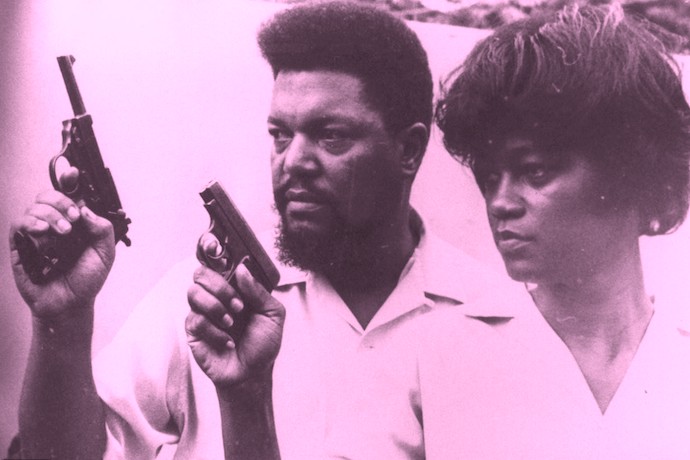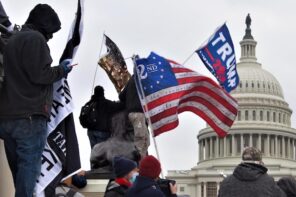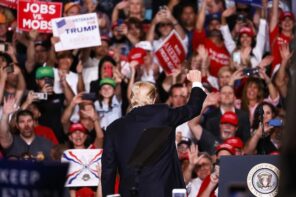there is no such thing
as good or bad
there is only justice.
no justice
no peace.
My Mother Was a Freedom Fighter, Aja Monet
And I know we too are made
of all the things that we have
lost here
Day After Tomorrow,” Tom Waits
I hold tears in my eyes sometimes. But not often. Lately, I’ve had reason to lament as multiple news outlets have been reporting on increasing gun ownership among Black Americans. This trend has reminded me that when people are frequently traumatized, their breaking point can sometimes lead to violent retaliation. My turmoil is deepened by the fact that a significant contingency of Americans made a putsch on the Capitol in a prelude to what feels like their push for the final solution to the “Negro problem.” No longer is the fantasy of Black retaliation an antecedent for white supremacist violence. This reality has so traumatized Black Americans that many are arming up.
Dissimilar to the mob that rushed the Capitol, Black Americans have been legitimately traumatized by the state treading on their right to jog, to play at the park—to exist. In response, many are arming themselves and grouping up with like-minded individuals. Philip Smith is the founder and president of one of these groups, the National African American Gun Association (NAAGA). “I pray that people recognize our humanity,” says Smith in a featured interview on NPR. And if prayer doesn’t work and Black bodies continue to be the canvas on which vigilante “justice” and state sanctioned executions are displayed? Then NAAGA and other groups are willing to embrace the any-means-necessary approach to make it stop.
There was a time when Black Americans’ inalienable rights were promised to us so long as we kept things “civil” by begging, marching and waiting. We obliged and, as a result, King was assassinated, the Crime Bill was passed, and the Voting Rights Act was struck down. How did Black Jesus phrase it? “We played the [minstrel] for you, and you did not dance, [we put our hands up], and you did not mourn.” (Matt. 11:17)
I grew up in an interracial Christian household where the Rev. Dr. Martin Luther King Jr. was the fourth person of the Trinity. My family sainted him not just because he fought for the opportunity for families like ours to exist, but because he fought for (racial) justice in a nonviolent way that we believed to be synonymous with Jesus’s methods. But a moment from my childhood that has stayed with me is when my mom taught me about Nat Turner’s rebellion. My mom is white. More interestingly, she is a pacifist. My question to her came as a statement seeking reassurance: “Nat Turner and the slaves were wrong.”
Her counter: “They were soldiers of freedom.”
My mom’s counter was completely right, but only half true. Ever since the settlers started manifesting what they believed was their “destiny” in America, Black people have been cast as freedom fighters, regardless of whether they’ve used violent or nonviolent tactics. That the fight to be recognized as human can be framed in terms conjuring images of war feels wrong. It feels wrong because forcing someone to be a soldier who must fight for their humanity to be affirmed causes a moral wound that can be passed down to later generations.
The study of trauma and its transgenerational impact is still in its nascent stages. Dr. Joy DeGruy was the first person I ever heard give a scientific explanation for how trauma generationally effects Black Americans due to slavery and centuries of unfreedom. As a result, many Black Americans experience symptoms commonly associated with PTSD. Resmaa Menakem’s bestselling book, My Grandmother’s Hands, has put trauma-informed paradigms at the center of understanding the invention of race and its deleterious effects, not only on “cultured” bodies, but bodies raced as “white” and “blue” as well.
Menakem previously worked with soldiers suffering from PTSD. Now, he’s working to help Americans, but specifically Black Americans, heal from racial trauma before that trauma is redirected into violence. That Black Americans have a history steeped in trauma and continue to experience new traumas is by design. The design has been codified into our Constitution. The design has infiltrated our water. All this is meant to harden Americans in general, but specifically Black Americans, to their subhuman class.
The trauma of historically being relegated to a subhuman class can manifest itself through 14 generations. No matter how callous we become to our individual trauma, our grandparents’ and our parents’ trauma (especially) can continue to impact us in profound ways unless we take steps to heal. There is a tender spot on every callous. Therapy, art, healthcare—those are possible salves to these tender spots. But what do you do when neither you nor your community has the time, ability, or means to tend to the tender spot? What do you do after you’ve attended a peaceful BLM protest where you were poked and prodded by the policeman’s billy club, but then you watch those same forces roll out the dais carpet for Christofascist mobs at the Capitol? One answer is to gird oneself with armaments.
Many Black folks feel the alternative to owning a gun is leaving oneself open to the prospect of more loss. We’ve already lost much. Those losses live in our bodies, reminding us daily that our freedom is not yet. Added to our daily trauma is the curse that we are always seen as armed and dangerous. Cellphones, toys, wallets, all of these objects become guns to the racialized eye. And if we are damned to always be seen holding a gun, why not actually hold a gun in hopes that our curse may become our enemies’ undoing? Owning a gun is a risk, but it’s a calculated one. The “well-intentioned” classify this calculated risk as “naïve” or “misguided.” Beyond appropriating Black culture and doing little legislatively, a favorite pastime of liberals is arguing that Americans, but especially Black Americans, should abstain from owning guns. We’ve already abstained from much.
Many Black Americans, including NAAGA president Philip Smith, have previously abstained from owning firearms. But beliefs have shifted because Black Americans are starting to believe firearms are indispensable for “the self-preservation of our communities” against the trauma of racist violence for which the perpetrators are rarely called to account. To make it plain, if there were little to no meaningful consequences for the insurrectionists and feckless politicians endorsing violence in the world’s Holy Temple of Democracy, there will be none if they bring their “Storm” to the West Side of Chicago. So with that in mind, what do you see when looking at the photos of Smith and his fellow soldiers, weighed down with their guns, waiting for roll call, desperate to protect themselves and their communities from impending terror? I see my dad. My dad is Black. More interestingly, he is a human.
A tragic and perverse expectation: America expects Black bodies to make the truth of their humanness self-evident. It seems trite to say, but bears repeating: not all Black people wish to be conscripted into this fight for freedom. Most wish to embrace anonymity, enjoying the mundane things other humans are afforded. Aren’t we in a strange hell then, that asserting the desire to live free from trauma and be seen as a human is considered more of an assault on America’s sacred institutions than, say, murdering a capitol police officer? As perverse as it is, even my aspiration for an ordinary existence is revolutionary. And that gets to the crux of our trauma: this country has forced us to be seen and to see ourselves as perpetual guerrillas. The situation is dire.
Breonna Taylor was not on duty. Or so she thought. She was at ease, resting. Death was her sentence! Her boyfriend, Kenneth Walker, owned a gun. He used it against the bandits. He was not fighting for justice, nor for freedom. He was fighting for something less principled, but just as real. He survived. But he lost. He’ll carry that loss with him for the rest of his days. Albeit in a drastically different way, we, as a country, will forever carry that loss as well.
Whether we are armed like Kenneth Walker, disarmed like Martin Luther King Jr. or completely dismembered, I know America will never see Black people as non-combatants. I am not pessimistically suggesting we will never be seen as humans, or live free from racist violence, or learn to put words to trauma so we might work towards healing. I am saying with certainty none of that will happen without a rupture in America itself.
No, not a reformed American Democracy, but a total breakage from America’s “terms of order” is crucial. That breakage will lead to a society where all people atonally abide in one another. A society where all people, regardless of their differences, have healthcare, income, education, power, and the ones who amassed wealth perpetuating our trauma are sent away empty. Open combat should not be a prerequisite for this society to be made manifest. But if that’s what it will take, then that’s what it will take. But let’s not fool ourselves about what it will cost.
I do not want to have the trauma of a soldier, and yet, I do. Some of that trauma I inherited from my parents, some of it I experienced first hand; all of it must be talked out, all of it must be hurled godward. Surely, the fight will come to an end. I believe that we will win. And then no longer will I be falsely cast as a soldier, but truly received as a human being. And holding tears in my eyes, I will sit at church, at the barber or in the bar and huddle with a rainbow coalition of veterans as we remember the days when we were called “soldiers of freedom” because we dared to exist.





